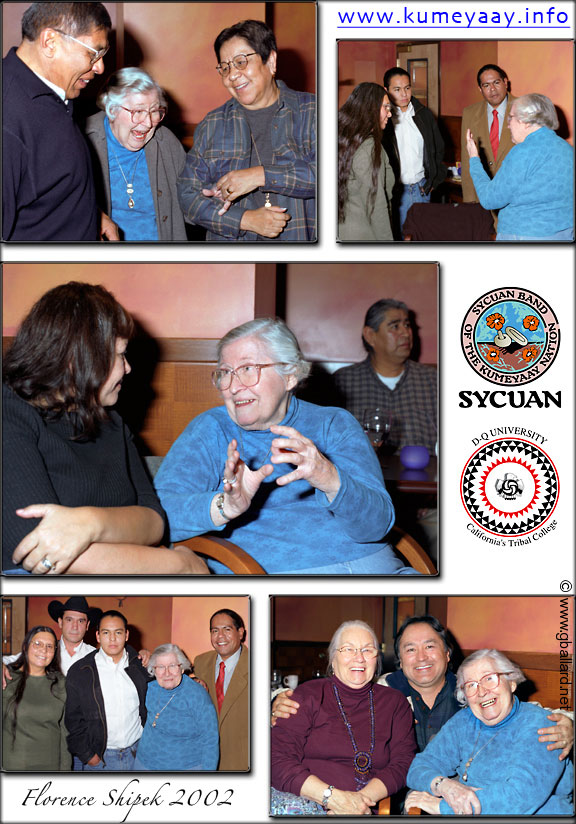 |
 |
|
IN LOVING MEMORY: Florence Connolly Shipek, Kumeyaay anthropologist By Chet Barfield January 12, 2003 Anthropologist Florence Connolly Shipek was the nation's top expert on San Diego's American Indians. Over a span of almost 50 years she became an advocate as well, championing legal rights for the region's tribes and tribal members. But mostly, she was a trusted friend. Dr. Shipek attended tribal ceremonies. She was honored at tribal functions. She was pictured in the Union-Tribune in September 2002 in a Viejas ad "saluting our elders." "I loved Florence dearly," Viejas tribal Chairman Anthony Pico said. "She had two passions: One was justice for the Kumeyaay people, and the other was the history of the Kumeyaay people." Dr. Shipek, a widow who lived alone, died Thursday at a local hospital after suffering a fall Wednesday night at her Shelter Island condominium. She was 84. She had been planning to move within days into a Pacific Beach seniors complex to join a scholarly best friend and other retired professors. Her son Carl found her Thursday morning near her bed, conscious but with her legs crumpled beneath her. "By the time we were in the emergency room, she was just gone," he said. Born in Massachusetts in 1918 during a December blizzard, Dr. Shipek was raised by parents who instilled independence, critical thinking, compassion for the downtrodden and confidence in achieving whatever she set out to do. "My mother marched in suffragette parades, and I have apparently been fighting ever since," she penned as the opening line of an unpublished autobiography she had been writing for the past several years. After traveling all over the country as a child, Dr. Shipek studied anthropology at the University of Arizona and became a professor at the University of Wisconsin. She married an oceanographer and moved to San Diego in the early 1950s. Her relationship with local tribes began in 1954 – not as a scholar, but a volunteer. She had gone to a meeting of a church group trying to help tribal members who were suddenly cut off from federal support by an act of Congress. She offered to help them through mazes of unfamiliar bureaucracies – hospitals, Social Security, schools, courts – and continued those efforts for years. In the late 1950s, attorneys working on tribal land claims tapped Dr. Shipek for her anthropology background and tribal contacts. She began taping interviews with elders ages 80 and older, documenting Indian ways and history dating to the 19th century. Her research, which she continued into the 1970s, resulted in two books and made her an expert witness in Indian land-and water-rights cases. Her documentation of tribal lineage helped the Jamul Indian Village gain federal recognition as a tribe in 1981. Dr. Shipek's love for Indian people stemmed from "wanting to help and realizing that she could make a difference," her son said. "She thought they'd been given a raw deal." Museum of Man anthropologist Ken Hedges was introduced to Dr. Shipek by a San Diego State University professor in 1966, when he was writing a book about the Indians' study of plants. She steered him toward a contact at Santa Ysabel who would be key in the research of his book. Hedges remembers her as someone who would "present the Indian point of view in a very forceful way." At one time, Dr. Shipek worked as a volunteer at the Museum of Man. Throughout her later years, Dr. Shipek remained involved in tribal issues. She was often a guest at tribal gatherings and lectured at various forums. News of her death spread quickly Friday throughout the region's tribes, leaving leaders and members shocked and saddened. "It's a great loss, not only for the Indian tribes but for San Diego County," Barona tribal Councilman Steve Banegas said. "She had a wealth of knowledge. She's going to be sorely missed." Tribal elders trusted Dr. Shipek because "she spent a lot of time with them. She paid her dues," Banegas said. "She didn't just take something from them. She would give things back." Dr. Shipek's fiery spirit was manifested in deciding to take on the U.S. government nearly 20 years ago, suing for what she contended was the wrongful death of her husband. He had succumbed to cancer in 1969 after being exposed to nuclear radiation at Bikini Atoll in the Marshall Islands in 1946 and in Nevada in 1952. It was a long battle never resolved. The government filed "appeal after appeal," her son said. "They were just going to outlast her, and they did." Dr. Shipek is survived by her sons, Carl of Point Loma and David of Cody, Wyo.; sisters, Edith Foster of Santa Cruz and Alice Mitchell of La Mesa; and three grandchildren. Memorial services are pending. The family suggests donations to the University of Arizona Foundation / Florence C. Shipek Library Endowment at the University of Arizona Libraries, Tucson, AZ 85721; or to D-Q University at Sycuan, 5478 Sycuan Road, El Cajon, CA 92019. |
| ###
Terms of Use • Privacy Statement • Site Map |